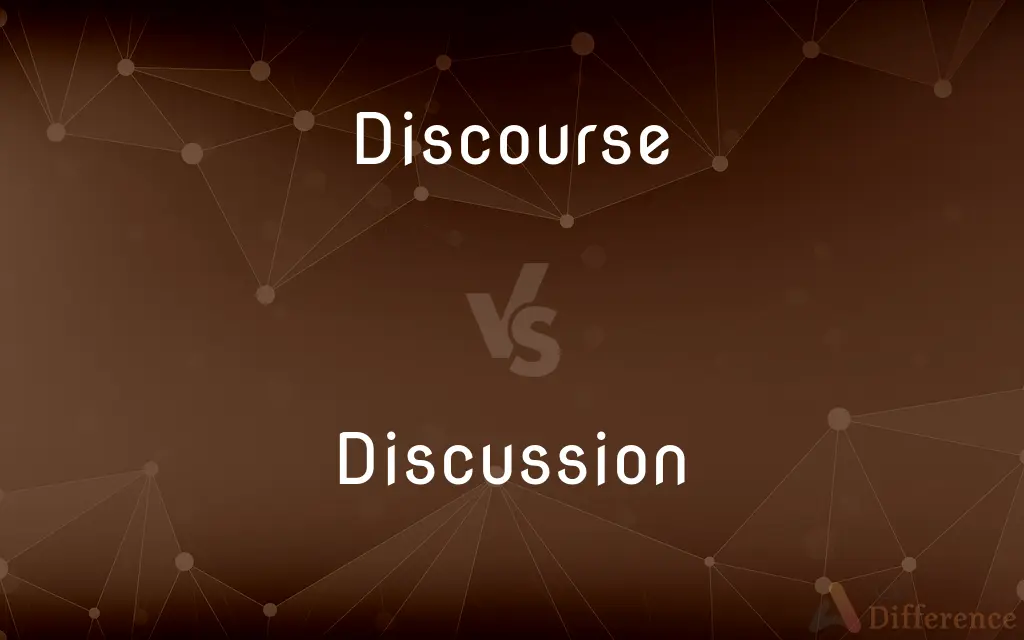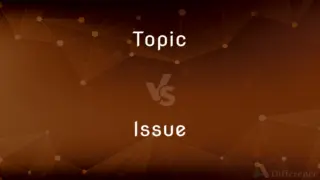Discourse vs. Discussion — What's the Difference?
By Tayyaba Rehman & Fiza Rafique — Updated on March 11, 2024
Discourse involves formal and structured communication or debate on a particular subject, often with a theoretical foundation, while discussion is a more general exchange of ideas or opinions among participants.

Difference Between Discourse and Discussion
Table of Contents
ADVERTISEMENT
Key Differences
Discourse is a broad term that encompasses written and spoken communication. It implies a higher level of formality and structure, often associated with academic, literary, or philosophical contexts. Discourse can include the conventions, purposes, and complexities of communication within a specific field or subject area. On the other hand, discussion is a conversational exchange where individuals share ideas, opinions, or information, typically in a more informal setting. Discussions can occur within the framework of discourse but are characterized by their interactive and participatory nature.
Discourse often serves to explore, explain, or expand upon complex ideas and can be seen in the form of essays, lectures, or scholarly articles. It is not just about the content but also about how that content is organized and presented within the conventions of the relevant discipline. Whereas, discussions are generally more spontaneous and can range from casual conversations to structured debates, emphasizing the process of exchanging viewpoints and coming to a mutual understanding or decision.
In discourse, the focus is on the method and structure of communication, reflecting upon itself and its role within a larger context of knowledge or society. It involves analyzing and understanding the underlying assumptions, values, and frameworks that shape communication. Discussions, in contrast, may not always engage with these meta-level considerations, focusing more on the immediate exchange of ideas and collaborative problem-solving.
The role of the participant also differs between the two. In discourse, individuals may assume roles based on their expertise or the rhetorical structure of the discourse itself, such as author and reader, or speaker and audience. In discussions, roles are more fluid, with participants actively engaging, questioning, and responding to one another in a dynamic exchange.
Both discourse and discussion are essential for the development and dissemination of ideas. Discourse provides the theoretical and structured framework for exploring complex subjects, while discussion offers a platform for the active and collaborative engagement with those ideas, allowing for clarification, exploration, and potentially new insights.
ADVERTISEMENT
Comparison Chart
Nature
Formal and structured
Informal and conversational
Context
Academic, literary, philosophical
General exchange of ideas or opinions
Focus
Exploration of complex ideas, method of communication
Exchange of viewpoints, collaborative problem-solving
Format
Essays, lectures, scholarly articles
Casual conversations, structured debates
Role of Participants
Defined by expertise or rhetorical structure
Fluid, with active engagement and response
Compare with Definitions
Discourse
Reflects conventions within a specific field.
Medical discourse often utilizes a specific set of terminologies and methodologies.
Discussion
Allows for immediate exchange and response.
During the discussion, several viewpoints were considered and debated.
Discourse
Analyzes underlying assumptions and values.
The discourse on ethics in technology explores the impact of innovation on society.
Discussion
An exchange of ideas or opinions in a conversational setting.
The discussion on renewable energy options was enlightening.
Discourse
A formal and structured way of discussing or writing about a topic.
The academic discourse on climate change has evolved significantly over the years.
Discussion
Focuses on collaborative problem-solving.
The team's discussion led to a breakthrough in the project.
Discourse
Engages with the content at a meta-level.
His discourse on narrative structures examines the role of storytelling in culture.
Discussion
Can be informal and spontaneous.
Our casual discussion at dinner sparked an innovative idea.
Discourse
Involves complex ideas and theoretical foundations.
Her discourse on modern art challenges traditional perspectives.
Discussion
Encourages active participation and engagement.
The lively discussion in class helped students better understand the concept.
Discourse
Discourse is a generalization of the notion of a conversation to any form of communication. Discourse is a major topic in social theory, with work spanning fields such as sociology, anthropology, continental philosophy, and discourse analysis.
Discussion
The action or process of talking about something in order to reach a decision or to exchange ideas
The EC directive is currently under discussion
The committee acts as a forum for discussion
Discourse
Verbal expression in speech or writing
Political discourse.
Discussion
Consideration of a subject by a group; an earnest conversation.
Discourse
Verbal exchange or conversation
Listened to their discourse on foreign policy.
Discussion
A formal discourse on a topic; an exposition.
Discourse
A series of connected remarks about a subject.
Discussion
Conversation or debate concerning a particular topic.
There was then a long discussion of whether to capitalize words like "east".
This topic is not open to discussion.
My discussion with the professor was very enlightening.
Discourse
A formal, lengthy treatment of a subject, either written or spoken.
Discussion
Text giving further detail on a subject.
Under each heading, you will find a discussion.
Discourse
(Archaic) The process or power of reasoning.
Discussion
The dispersion of a tumour.
Discourse
To speak or write formally and at length.
Discussion
The act or process of discussing by breaking up, or dispersing, as a tumor, or the like.
Discourse
To engage in conversation or discussion; converse
“The two men walked around the city and discoursed on its antiquities” (Michael Wood).
Discussion
The act of discussing or exchanging reasons; examination by argument; debate; disputation; agitation.
The liberty of discussion is the great safeguard of all other liberties.
Discourse
To narrate or discuss.
Discussion
An extended communication (often interactive) dealing with some particular topic;
The book contains an excellent discussion of modal logic
His treatment of the race question is badly biased
Discourse
Verbal exchange, conversation.
Discussion
An exchange of views on some topic;
We had a good discussion
We had a word or two about it
Discourse
(uncountable) Expression in words, either speech or writing.
Discourse
(countable) A formal lengthy exposition of some subject, either spoken or written.
The preacher gave us a long discourse on duty.
Discourse
(countable) Any rational expression, reason.
Discourse
An institutionalized way of thinking, a social boundary defining what can be said about a specific topic (after Michel Foucault).
Discourse
(obsolete) Dealing; transaction.
Discourse
(intransitive) To engage in discussion or conversation; to converse.
Discourse
(intransitive) To write or speak formally and at length.
Discourse
To debate.
Discourse
To exercise reason; to employ the mind in judging and inferring; to reason.
Discourse
To produce or emit (musical sounds).
Discourse
The power of the mind to reason or infer by running, as it were, from one fact or reason to another, and deriving a conclusion; an exercise or act of this power; reasoning; range of reasoning faculty.
Difficult, strange, and harsh to the discourses of natural reason.
Sure he that made us with such large discourse,Looking before and after, gave us notThat capability and godlike reasonTo fust in us unused.
Discourse
Conversation; talk.
In their discourses after supper.
Filling the head with variety of thoughts, and the mouth with copious discourse.
Discourse
The art and manner of speaking and conversing.
Of excellent breeding, admirable discourse.
Discourse
Consecutive speech, either written or unwritten, on a given line of thought; speech; treatise; dissertation; sermon, etc.; as, the preacher gave us a long discourse on duty.
Discourse
Dealing; transaction.
Good Captain Bessus, tell us the discourseBetwixt Tigranes and our king, and howWe got the victory.
Discourse
To exercise reason; to employ the mind in judging and inferring; to reason.
Discourse
To express one's self in oral discourse; to expose one's views; to talk in a continuous or formal manner; to hold forth; to speak; to converse.
Bid me discourse, I will enchant thine ear.
Discourse
To relate something; to tell.
Discourse
To treat of something in writing and formally.
Discourse
To treat of; to expose or set forth in language.
The life of William Tyndale . . . is sufficiently and at large discoursed in the book.
Discourse
To utter or give forth; to speak.
It will discourse most eloquent music.
Discourse
To talk to; to confer with.
I have spoken to my brother, who is the patron, to discourse the minister about it.
Discourse
Extended verbal expression in speech or writing
Discourse
An address of a religious nature (usually delivered during a church service)
Discourse
An extended communication (often interactive) dealing with some particular topic;
The book contains an excellent discussion of modal logic
His treatment of the race question is badly biased
Discourse
To consider or examine in speech or writing;
The article covered all the different aspects of this question
The class discussed Dante's `Inferno'
Discourse
Carry on a conversation
Discourse
Talk or hold forth formally about a topic;
The speaker dissertated about the social politics in 18th century England
Common Curiosities
How does discussion differ from discourse?
Discussion differs from discourse in its informal, conversational nature, focusing on the exchange of ideas and collaborative engagement rather than structured exploration of complex subjects.
Why is discourse important in academic contexts?
Discourse is important in academic contexts because it provides a structured method to explore, analyze, and communicate complex ideas, theories, and research findings.
What is the main purpose of discourse?
The main purpose of discourse is to explore, explain, or expand upon complex ideas within a structured and formal framework.
Can a discussion be part of a discourse?
Yes, discussions can occur within the framework of discourse, especially when engaging with and exploring the ideas presented in a structured manner.
How do roles of participants differ in discourse and discussion?
In discourse, roles are often defined by expertise or the structure of the communication (e.g., author-reader, speaker-audience), whereas in discussion, roles are more fluid with participants actively engaging and responding.
Is it possible to have a discourse without discussion?
While it is possible to have discourse without active discussion (e.g., in a lecture or a written essay), engagement and dialogue often enrich and deepen the understanding of the discourse topic.
Can discourse influence society?
Yes, discourse can significantly influence society by shaping public opinion, informing policy decisions, and contributing to the cultural and intellectual landscape.
How can discussions lead to new insights?
Discussions can lead to new insights by bringing together diverse perspectives, encouraging critical thinking, and fostering collaborative exploration of ideas and solutions.
What role does language play in discourse?
Language plays a crucial role in discourse, as it shapes the way ideas are presented, interpreted, and understood within the context of cultural, social, and disciplinary conventions.
What makes a discussion effective?
An effective discussion is characterized by open communication, mutual respect, active listening, and the willingness to consider and explore diverse viewpoints.
Share Your Discovery

Previous Comparison
Topic vs. Issue
Next Comparison
Capelin vs. SmeltAuthor Spotlight
Written by
Tayyaba RehmanTayyaba Rehman is a distinguished writer, currently serving as a primary contributor to askdifference.com. As a researcher in semantics and etymology, Tayyaba's passion for the complexity of languages and their distinctions has found a perfect home on the platform. Tayyaba delves into the intricacies of language, distinguishing between commonly confused words and phrases, thereby providing clarity for readers worldwide.
Co-written by
Fiza RafiqueFiza Rafique is a skilled content writer at AskDifference.com, where she meticulously refines and enhances written pieces. Drawing from her vast editorial expertise, Fiza ensures clarity, accuracy, and precision in every article. Passionate about language, she continually seeks to elevate the quality of content for readers worldwide.















































